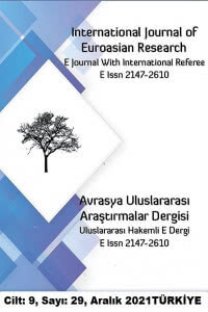ARADA KALANLARIN ROMANI: ARAF
Dünya edebiyatında altmışlardan sonra, Türk edebiyatında ise, seksenlerden sonra ortaya çıkan postmodern roman, hemen her açıdan geleneksel roman anlayışından farklılık gösterir. Türk edebiyatının son dönem yazarlarının çoğunda bu akımın özellikleri görülür. Bunda değişen dünyanın değer yargılarını ve algılarını postmodern romanın daha başarılı yansıttığı inancı etkilidir. Günümüz edebiyat eserinde birden fazla anlamsal katmanın olması, okuyucuyu farklı okumalara götürerek onun da anlatıyı kurgulama açısından yazarla eşit söz hakkına sahip olduğunu gösterir. Böylece yazar okuruna imkânı sunup aradan çekilir ve metnin arka plânını okuyucu tamamlar. Elif Şafak’ın Araf’ı, postmodern roman anlayışını yansıtan bir anlatıdır. Bu çalışmada öne çıkan özellikler, belli başlıklar altında incelenmiş ve anlatıdaki postmodern anlayışa dikkat çekilmiştir. Ancak romandaki postmodern özellikler üzerinde durulurken, bir yandan da olay örgüsü, zaman, mekân, şahıs kadrosu gibi klasik romanın unsurları, postmodern bir yaklaşımla değerlendirilmeye çalışılmıştır. Ayrıca romanda sık sık vurgulanan “isim”ler vesilesiyle birtakım değerlendirmeler yapılmış, bu isimlerin romana kattığı anlam üzerinde durulmuştur. Araf, okuyucuyu düşünmeye yöneltmek amacıyla karmaşık bir olay örgüsüyle kurgulanmıştır. Postmodern metinlerde olduğu gibi zaman, parçalı ve dağınıktır. Anlatıda mekân, genellikle bireyle özdeşleşip onu tahakkümü altına almasa da yer yer işlevsel olarak kullanılır. Ayrıca modern romanda idealize edilmiş, çelişiksiz bireye verilen önemin aksine, postmodern romanda paradoksları olan, duruma göre değişebilen özneye önem verilir. Metinlerarasılık ve imge romanın öne çıkan özelliklerini oluştururlar.
THE NOVEL OF PURGATORY: ARAF
The postmodern novel, that arises after the sixties in world literature, after the eighties in Turkish literature, vary from traditional novel concept in every respect. Characteristics of this trend are seen in most of the authors of the last period of Turkish literature. Here, the effective is that post-modern novel reflects value judgments and perceptions of the changing world more successfully. In today's literary works’ having more than one semantic layer takes the reader different readings and shows that he has the right to an equal voice with the author. Thus, the author presents his/her reader the opportunity and he/she fades from the scene and the reader complete the background to the text. Elif Şafak’s Araf is a narrative which reflects postmodern novel conception. The outstanding features in this study have been analyzed under some headings and postmodern conception of narrative has been pointed out. However, on the one hand the postmodern novel features have been focused on; on the other hand elements of a classic novel such as the plot, time, place, characters have been evaluated with a postmodern approach. In addition, on the occasion of some names, which are often emphasized in the novel, a number of evaluations have been done and the meaning of these names, added into the novel, has been focused on. Araf has been fictionalised with a complex plot in order to make the reader think. The time, as usual in postmodern texts, is scattered and fragmented. The place in narrative is sometimes used functionally even though it is identified with the reader and dominates them. On the contrary to giving importance to idealized and noncontradictory person in modern novel, the importance is given to the subject, who has paradoxes and can change according to circumstances. Intertextuality and image form the key features of the novel.
Keywords:
Postmodernism, Elif Şafak, Araf novel.,
___
- BOYNUKARA, Hasan, (2009). “Şafak’ın Pinhan’ını Anlamak”, 1980 Sonrası Türk Romanı Sempozyumu 27-28 Mart 2008 Bildiriler, (Yayına Haz. Hülya Argunşah, Ayşe Demir), Kayseri: Erciyes Üniversitesi Yayınları.
- DELEUZE, Gilles, (2000). Spinoza Üzerine On Bir Ders, (Çev. Ulus Baker), Ankara: Öteki yayıncılık.
- DEMİRCİ, Neşe, (2010). “Elif Şafak’ın Pinhan, Araf ve Mahrem’inde İsim İmgelemi”, Turkish Studies, Volume 5/3: 997-1007. DOLTAŞ, Dilek, (2003). Postmodernizm ve Eleştirisi, Tartışmalar/Uygulamalar, İstanbul: İnkılap Yayınları.
- EAGLETON, Terry, (2011). Postmodernizmin Yanılsamaları, İstanbul: Ayrıntı Yayınları.
- ECEVİT, Yıldız, (2004). Türk Romanında Postmodernist Açılımlar, İstanbul:
- ISSN: 2147-2610
- Yayın Aralığı: Yılda 4 Sayı
- Başlangıç: 2012
- Yayıncı: Kürşat Öncül
Sayıdaki Diğer Makaleler
ERMENİSTAN-AZERBAYCAN MÜNAKAŞASIMEDENİYETLERARASI MÜNASEBETLER KAPSAMINDA
YUSUF'UN MASALI'NI İNSANLIĞIN MASALI OLARAK OKUMAK
ZİYA OSMAN SABA’NIN “BEYAZ EV” ADLI ŞİİRİ ÜZERİNE BİR İNCELEME
Seriyye GÜNDOĞDU, Bayram GÜNDOĞDU
NİZAMİ GƏNCƏVİNİN «YEDDİ GÖZƏL» POEMASINDA KAMILLƏŞMƏ MODELİNİN ŞƏRHİ
ÇAĞDAŞ RUS VE TÜRK DİLLERİNDE AKRABALIK TERİMİ OLARAK ‘ANA’
